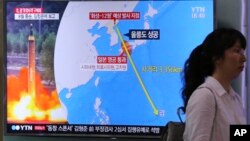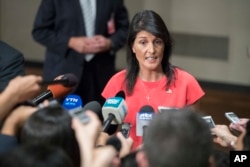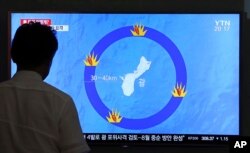U.S. President Donald Trump stiffened his resolve against North Korea Thursday, saying that if Pyongyang initiates warfare "things will happen to them like they never thought possible."
In his latest bellicose warning, Trump said that his earlier comments vowing to inflict "fire and fury" on the reclusive communist regime for its nuclear weapons development program maybe were not "tough enough."
Asked what would be tougher, Trump told reporters at his golf resort in Bedminster, New Jersey, "You'll see. ... North Korea better get their act together, or they're going to be in trouble like few nations ever have been in trouble in this world."
Trump spoke hours after North Korea said it is finalizing a plan to launch a salvo of four ballistic missiles to the waters off the shores of the U.S. territory of Guam, Pyongyang's latest provocation in the war of words between it and Washington.
In an unusually detailed announcement, North Korea's military said that within a week it would hand the regime's leader, Kim Jong Un, a plan to fire the Hwasong-12 missiles over Japan toward Guam, 3,300 kilometers to the south.
State media said the missiles would land 30 to 40 kilometers off the shores of Guam, where 163,000 people live and the U.S. has 7,000 military personnel at a naval installation and an air base.
General Kim Rak Gyom, the commander of the North's strategic rocket forces, told the state-run KCNA news agency that after the plan is given to Kim, the military would "wait for his order."
Mixed signals
Until Trump's latest remarks, Washington had sent mixed signals to the world this week in its effort to thwart North Korea's nuclear weapons development in the aftermath of a new round of sanctions unanimously approved last weekend by the United Nations Security Council.
Trump had vowed to attack North Korea, if it starts a war, with a "fire and fury like the world has never seen." And Defense Secretary Jim Mattis said Pyongyang risks annihilation with military action. But Secretary of State Rex Tillerson said, "I think Americans should sleep well at night and have no concerns about this particular rhetoric of the last few days."
World stock markets, averse to the uncertainty of the standoff, slid for the second day in a row on Thursday, with stock indexes in Asia, Europe and the United States all falling a fraction of a percentage point or, at some exchanges, more than 1 percent.
General Kim said that "sound dialogue" is not possible with Trump, calling him a man "bereft of reason." He said "only absolute force can work on him" and described Trump's "fire and fury" threat as "a load of nonsense."
Mattis said Thursday that Trump was "just showing the concern he has, that is shared, obviously, globally." The U.S. defense chief said North Korea "would lose any arms race or conflict it initiates."
If North Korea carries out the missile launch aimed toward Guam, the U.S. could attempt to shoot down the missiles. It has six Aegis ballistic missile defense ships in the region capable of targeting North Korean missiles. But if Pyongyang were to launch the four missiles simultaneously, it could make it harder to shoot down all of them.
Firing the missiles over Japan would ratchet up North Korea's military adventurism. Its test missiles in recent months, launched at a very high angle, have landed in waters off Japan, although within its economic zone.
'Stern and strong response'
If the North carries out its missile launch plan aimed near Guam, South Korea said it would draw a "stern and strong" response from Washington and Seoul.
Japan Defense Minister Itsunori Onodera told parliament that a North Korean missile attack on Guam would constitute a Japanese national emergency, saying it would imperil Japan's existence as a nation.
The threats and counterthreats between Pyongyang and Washington have occurred this week in the days after the U.N. Security Council imposed new, more stringent sanctions on North Korea. The new penalties are intended to reduce Pyongyang's income from exported goods and labor by at least $1 billion — one-third of its current annual earnings — in an effort to end its nuclear weapons development.
The U.S. Defense Intelligence Agency concluded in the past month that North Korea has now miniaturized a nuclear warhead capable of being attached to an intercontinental missile. If Pyongyang does have such capability, it would make North Korea the world's ninth full-fledged nuclear power.
Mattis, in a statement Wednesday, said North Korea "should cease any consideration of actions that would lead to the end of its regime and the destruction of its people." He said North Korea "must choose to stop isolating itself and stand down its pursuit of nuclear weapons."
He warned that the United States and its allies "now possess the most precise, rehearsed and robust defensive and offensive capabilities on earth," and that any North Korean military operation "will continue to be grossly overmatched by ours."
Mattis' vow came hours after Trump declared in a Twitter comment that the U.S. nuclear arsenal "is now far stronger and more powerful than ever before."






